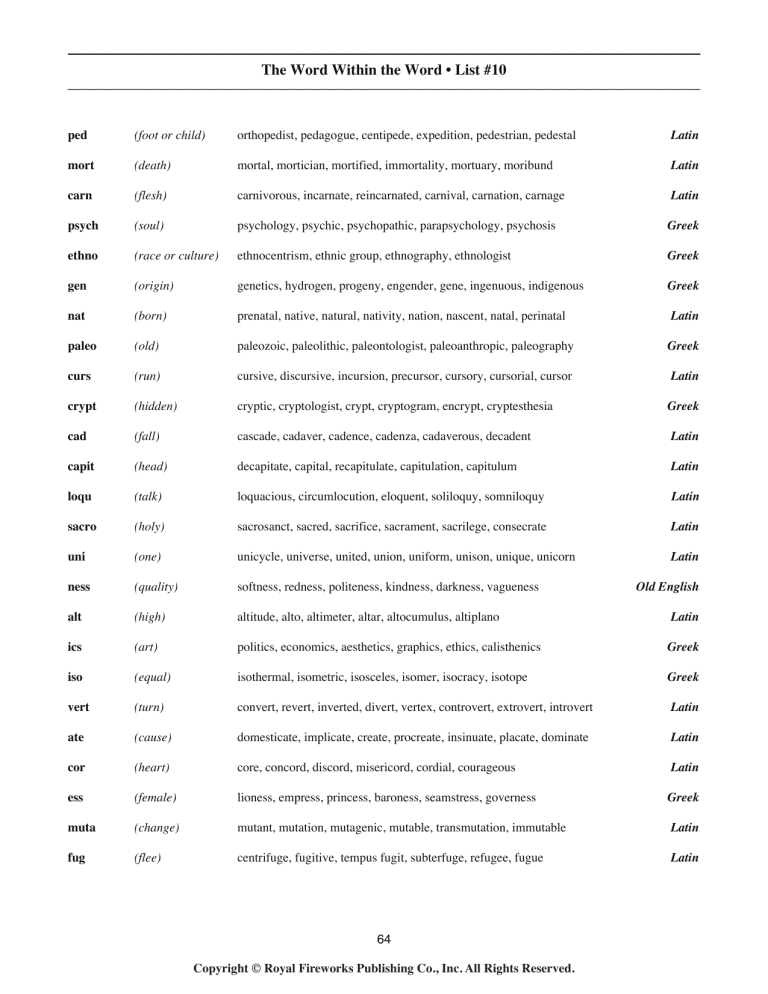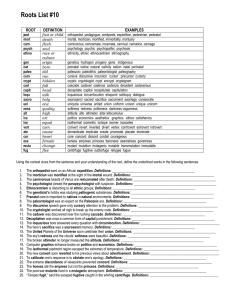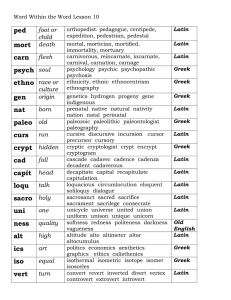
____________________________________________________________________________________
The Word Within the Word • List #10
____________________________________________________________________________________
ped
(foot or child)
orthopedist, pedagogue, centipede, expedition, pedestrian, pedestal
Latin
mort
(death)
mortal, mortician, mortified, immortality, mortuary, moribund
Latin
carn
(flesh)
carnivorous, incarnate, reincarnated, carnival, carnation, carnage
Latin
psych
(soul)
psychology, psychic, psychopathic, parapsychology, psychosis
Greek
ethno
(race or culture)
ethnocentrism, ethnic group, ethnography, ethnologist
Greek
gen
(origin)
genetics, hydrogen, progeny, engender, gene, ingenuous, indigenous
Greek
nat
(born)
prenatal, native, natural, nativity, nation, nascent, natal, perinatal
Latin
paleo
(old)
paleozoic, paleolithic, paleontologist, paleoanthropic, paleography
Greek
curs
(run)
cursive, discursive, incursion, precursor, cursory, cursorial, cursor
Latin
crypt
(hidden)
cryptic, cryptologist, crypt, cryptogram, encrypt, cryptesthesia
Greek
cad
(fall)
cascade, cadaver, cadence, cadenza, cadaverous, decadent
Latin
capit
(head)
decapitate, capital, recapitulate, capitulation, capitulum
Latin
loqu
(talk)
loquacious, circumlocution, eloquent, soliloquy, somniloquy
Latin
sacro
(holy)
sacrosanct, sacred, sacrifice, sacrament, sacrilege, consecrate
Latin
uni
(one)
unicycle, universe, united, union, uniform, unison, unique, unicorn
Latin
ness
(quality)
softness, redness, politeness, kindness, darkness, vagueness
alt
(high)
altitude, alto, altimeter, altar, altocumulus, altiplano
Latin
ics
(art)
politics, economics, aesthetics, graphics, ethics, calisthenics
Greek
iso
(equal)
isothermal, isometric, isosceles, isomer, isocracy, isotope
Greek
vert
(turn)
convert, revert, inverted, divert, vertex, controvert, extrovert, introvert
Latin
ate
(cause)
domesticate, implicate, create, procreate, insinuate, placate, dominate
Latin
cor
(heart)
core, concord, discord, misericord, cordial, courageous
Latin
ess
(female)
lioness, empress, princess, baroness, seamstress, governess
Greek
muta
(change)
mutant, mutation, mutagenic, mutable, transmutation, immutable
Latin
fug
(flee)
centrifuge, fugitive, tempus fugit, subterfuge, refugee, fugue
Latin
64
Copyright © Royal Fireworks Publishing Co., Inc. All Rights Reserved.
Old English
The Word Within the Word • Stem Close-Up #10
____________________________________________________________________________________
sub
under • beneath • below
The Latin stem sub, which we define as meaning under, actually can have a wide variety of meanings, and is sometimes
shortened to suc, suf, sug, sum, sup, sur, and even sus in order to blend with the stem that follows it. Though sub often
means under, it can mean beneath, below lower, somewhat, or even inferior. Here are some of the interesting words that
contain sub in its various shades of meaning:
subcutaneous:
subduct:
beneath the skin. He was troubled by a subcutaneous infection.
to draw downward. She swam against the subduction in the offshore current.
sublunary:
under the moon. The lovers enjoyed a beautiful sublunary dance.
sublimate:
to express acceptably. The urge of the id can find creative sublimations.
submontane:
at the foot of the mountains. The submontane vegetation was more lush.
subtle:
subvert:
not obvious. Subtle clues told her to avoid asking about the problem.
to overthrow. They worked to subvert the established regime.
substratum:
foundation. His peaceful humility was founded on a substratum of religion.
subsistence:
bare survival. They survived at a subsistence level by gathering food.
subaqueous:
underwater. The subaqueous habitation gradually developed into a city.
subservient:
obsequious. The toadyʼs subservient fawning irritated her.
subtrahend:
number subtracted. The deduction was a fearful subtrahend from the check.
surreptitious:
done in secret. The plans were made at a surreptitious meeting in the Alps.
suffuse:
to fill with color. Becky Thatcherʼs face was suffused with embarrassment.
suffrage:
voting. Womenʼs suffrage began very late in American history.
succinct:
brief and clear. Her succinct description impressed them all.
suggest:
to mention. He suggested a solution, but no one listened.
suffocate:
suspend:
sustain:
summon:
to smother. Small businesses were being suffocated by federal regulations.
to hang. The bridge was suspended from massive cables.
maintain. They were unable to sustain their initial enthusiasm.
order to appear. The peremptory summons was ignored.
65
Copyright © Royal Fireworks Publishing Co., Inc. All Rights Reserved.
____________________________________________________________________________________
The Word Within the Word • Sentences #10
____________________________________________________________________________________
1.
The orthopedist went on an African expedition.
2.
The mortician was mortified at the sight of the mortal wound.
3.
The carnivorous beasts of Venus are reincarnated after death.
4.
The psychologist viewed the parapsychologist with suspicion.
5.
Ethnocentrism is disturbing to all ethnic groups.
6.
The geneticistʼs hobby was studying pathogenic substances.
7.
Prenatal care is important to natives in natural environments.
8.
The paleontologist was an expert on the Paleozoic era.
9.
The discursive speech gave only cursory attention to the problem.
10.
The cryptologist worked all night to break the enemy secret code.
11.
The cadaver was discovered near the rushing cascade.
12.
Decapitation was once a common form of capital punishment.
13.
The loquacious bore answered every question with a circumlocution.
14.
The heroʼs sacrifice was a sacrosanct memory.
15.
The United Planets of the Universe soon celebrate their union.
16.
The skyʼs redness and the cloudsʼ softness were beautiful.
17.
The broken altimeter no longer measured the altitude.
18.
Computer graphics enhance books on politics and economics.
19.
The isothermal piedmont region escaped the extremes of temperature.
20.
The new convert soon reverted to his previous views about advertisement.
21.
To calibrate oneʼs response is to obviate oneʼs apology.
22.
The extreme discordance of viewpoints prevented concord.
23.
The lioness ate the empress but not the princess.
24.
The post-war mutants lived in a mutagenic atmosphere.
25.
“Tempus fugit,” said the escaped fugitive caught in the whirling centrifuge.
66
Copyright © Royal Fireworks Publishing Co., Inc. All Rights Reserved.
____________________________________________________________________________________
The Word Within the Word • Ideas #10
____________________________________________________________________________________
EMOTION:
1.
How would you feel if you were forced to capitulate (Imagine the circumstances for yourself.)? How would you feel
if someone were forced to capitulate to you?
2.
Imagine your emotions if mutagenic substances were discovered in your drinking water, substances that could be
traced to a nearby toxic waste dump. Who would you seek out for actions and explanations.
AESTHETICS:
1.
What sounds do these words suggest: unison, carnival, darkness, centrifuge, refugee, sacrifice, Paleozoic,
calisthenics, and universe?
2.
Is your artistic appreciation ethnocentric? Can you think of another—especially a very different—culture whose art
you deeply admire?
SYNTHESIS:
1.
Pick an example word in List #10 and use at least three other words from the list to define the word you picked.
2.
Make a cryptogram using words from List #10. To make it more difficult, use words from one field of thought
only—use words from biology, or history, etc.
DIVERGENCE:
1.
How many cracy or archy words can you think of which are names for different forms of government? Donʼt forget
isocracy, a government in which each person has an equal amount of power to every other person. Once you have
remembered as many as you can, see how many forms of government you can invent, such as the dormocracy: the
government that seems to be asleep! Invent as many new governments as you can.
2.
Have you ever been trapped by someone who wanted to talk about a subject you wished to avoid? Or who wanted to
ask a question you didnʼt want to answer? How many clever subterfuges can you think of to escape such a situation?
As an example, “Iʼd love to talk to you now, but I left a poodle in the microwave petwash.”
67
Copyright © Royal Fireworks Publishing Co., Inc. All Rights Reserved.
____________________________________________________________________________________
The Word Within the Word • Analogies #10
____________________________________________________________________________________
1.
subterfuge : fugitive ::
circumlocution : orthopedist
politics : economics
lioness : empress
ingenuous : indigenous
6.
ethnologist : ethnic group ::
entomologist : altimeter
psychologist : ethnography
paleontologist : tyrannosaurus
cryptologist : cryptogram
2.
unicycle : unique ::
fugitive : refugee
soliloquy : solitude
extrovert : introvert
concord : discord
7.
consecration : sacrilege ::
mutagenic : immutable
precursor : forerunner
nascent : moribund
paleozoic : paleontologist
3.
dialogue : soliloquy ::
altimeter : altitude
mutagen : mutation
colloquy : monologue
aesthetics : graphics
8.
eloquent : soliloquy ::
ingenuous : progeny
psychic : psychology
incarnate : carnival
grandiloquent : panegyric
4.
domination : capitulation ::
decapitate : recapitulate
natal : perinatal
pedagogue : pedestrian
rule : surrender
9.
softness : kindness ::
roughness : ingenuousness
somniloquy : discursive
decadence : cadence
cryptologist : encryption
5.
aesthetics : ethics ::
convert : revert
sacrosanct : sacred
art : morals
economics : psychopathic
10. lioness : carnivorous ::
extrovert : loquacious
convert : introvert
sacrifice : sanguinary
alto : cadenza
68
Copyright © Royal Fireworks Publishing Co., Inc. All Rights Reserved.
____________________________________________________________________________________
The Word Within the Word • Notes #10
____________________________________________________________________________________
1.
A Micropoem: Has there been a recent expedition to the headwaters of the Amazon? A common characteristic of
expeditions is suggested by the word itself: members of an expedition go out (ex) into the wild on foot (ped).
2.
We have all had the displeasure of listening to circumlocution. That is when someone is talking (loqu) in circles
(circum). But there are two main varieties of circumlocution. There is unintentional circumlocution in which a person
is talking in circles and doesnʼt realize it, and there is intentional circumlocution in which someone talks in circles in
order to evade answering a question.
3.
A Micropoem: A subterfuge is a clever evasion in which a person tries to avoid revealing something; it is an evasive
trick, a stratagem. A literal interpretation of subterfuge might be to duck, in the sense of ducking a question, since
subterfuge means to flee (fug) under (sub).
4.
We say that a speech is discursive if it is rambling and digressive—if the speaker doesnʼt stick to the point. The literal
meaning of discursive, however, is somewhat more exciting. A speech is discursive if it is a runaway, if it is out of
control. The speaker has let the speech run (curs) away (dis) from him.
5.
You wouldnʼt think that hydrogen would be an interesting word. Hydrogen is the name of the simplest and most
common element in the universe, but on our planet we possess a wonderful hydrogen-based treasure: water. The
importance of water to human life can hardly be exaggerated—even our bodies are mostly water. So when it was time
to give hydrogen a name, the obvious choice was to name hydrogen after its most important role: hydrogen is the main
ingredient in the creation (gen) of water (hydro). Hydrogen is the water-originator. No H, no H2O.
6.
One of the most biting terms of derision is the adjective pedestrian. We say that someone has pedestrian taste, or
worse, a pedestrian mind. This means that the person simply never attains anything lofty or swift, graceful or elegant;
he just slogs along on foot (ped), altitude zero, speed 1 mph.
7.
The word cadaver is unusually poignant. All of our lives we live in the earthʼs gravitational field, and the vitality of
our bodies allows us to resist that invisible force which constantly pulls down on us. We spend our lives exerting equal
but opposite force to resist succumbing to gravityʼs mysterious force field. At the end of our lives, gravitation wins,
and we fall (cad). A cadaver is a fallen person.
8.
Unique is a perfectly self-explanatory word. It means precisely what its stem uni (one) implies. There is only one.
Something cannot be rather unique; either it is one-of-a-kind and is unique, or there are other such cases, and it is not
unique.
9.
Spanish Cognates: One of the most important observations to gain from the study of the etymology of English
vocabulary is that English and Spanish share thousands of words that are cognates, related words, that have common
origins. Often, the English and the Spanish word share not only a stem, but even more than one stem, and often in the
same order. As examples, here are some English words from this lesson, and their Spanish cognates:
orthopedist : ortopeda
reincarnated : reincarnado
ingenious : ingenuo
crypt : cripta
cascade : cascada
decapitate : decapitar
unique : único
ethics : ética
indigenous : indígeno
69
Copyright © Royal Fireworks Publishing Co., Inc. All Rights Reserved.
____________________________________________________________________________________
The Word Within the Word • Classic Words #10
____________________________________________________________________________________
In each case below, one of the choices was really the word used by the author in the sentence provided. All of the
choices can be found in the example words on the first page of this lesson. Your challenge is to decide which word the author
used. This is not a test; it is more like a game, because more than one w ord choice may work perfectly well. See if you can
use your sensitivity and intuition to guess correctly which word the author used. You may need a dictionary.
1.
From Nathaniel Hawthorneʼs The House of the Seven Gables
I rejoice to hear so favorable and so __________ an account of my cousin Clifford.
a. decadent
b. loquacious
c. ingenuous
d. mutable
2.
From James Joyceʼs A Portrait of the Artist as a Young Man
His life had brown to be a tissue of __________ and falsehood.
a. subterfuge
b. circumlocution
c. capitulation
d. eloquence
3.
From Mark Twainʼs The Prince and the Pauper
He then walked up and down the room to keep his blood in motion, ________ as before.
a. circumlocuting
b. soliloquizing
c. consecrating
d. placating
4.
From Mary Shelleyʼs Frankenstein
How __________ are our feelings.
a. mutable
b. unique
c. moribund
d. nascent
5.
From Henry David Thoreauʼs Walden
The tortoise and the frog are among the __________ and heralds of this season.
a. ethnographies
b. pedagogues
c. pedestrians
d. precursors
70
Copyright © Royal Fireworks Publishing Co., Inc. All Rights Reserved.











